Time is nobody’s friend. Authors in particular can fall afoul of time—all it takes is a few years out of the limelight. Publishers will let their books fall out of print; readers will forget about them. Replace “years” with “decades” and authors can become very obscure indeed.
The Cordwainer Smith Rediscovery Award was founded in 2001 to draw attention to unjustly forgotten SF authors. It is a juried award; the founding judges were Gardner Dozois, Robert Silverberg, Scott Edelman, and John Clute. The current judges are Elizabeth Hand, Barry N. Malzberg, Mike Resnick, and Robert J. Sawyer1.
I wish the award were more widely known, that it had, perhaps, its own anthology. If it did, it might look a bit like this. Who are the winners? Why should you care about them? I am so happy I pretended you asked. In order of victory, from 2001 to 2018:
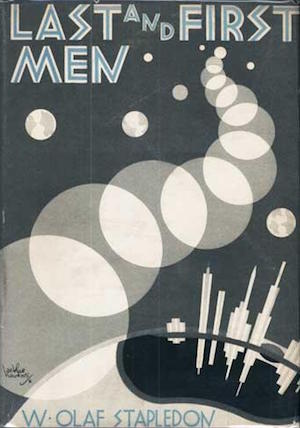
Olaf Stapledon (10 May 1886–6 September 1950) could write narrow focus novels when he wanted to. Sirius, for example, focuses on the life of an intelligent dog, while Odd John is the biography of a super-genius in a world that’s not ready for him. But Stapledon excelled at the epic: wide-focus visions of the past and future. Last and First Men covers the history of eighteen distinct human species over two billion years. Star Maker is even more ambitious; it narrates a history of the universe.
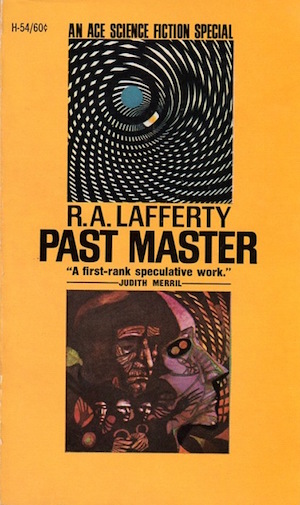
R.A. Lafferty (November 7, 1914–March 18, 2002) was not all that interested in plot. He excelled at setting and literary style. He’s not to everyone’s taste, but those who enjoy Lafferty’s work enjoy it intensely. Lafferty was sidelined by a long illness, during which time he was close to forgotten. In recent years publishers from Wildside to Centipede Press have brought his work back into print.
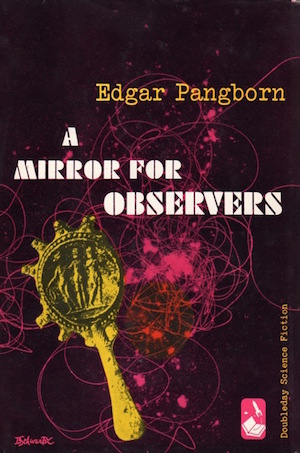
Edgar Pangborn (February 25, 1909–February 1, 1976) was active as a mystery writer for twenty years before he turned to science fiction in the 1950s. His humanist science fiction won fan acclaim. His novel A Mirror for Observers won the 1954 International Fantasy Award. Many of his later pieces form the Tales of a Darkening World sequence, set after war, plague, and climate change have reduced humanity to a tiny, barbaric remnant of today’s civilization. 1964’s Davy2 may be the best known in the series; I prefer the melancholy collection Still I Persist in Wondering. If read in publication order, Tales of a Darkening World betrays Pangborn’s increasingly pessimistic view of humans. Some early pieces are available on Gutenberg. SF Gateway’s Edgar Pangborn Omnibus is also in print.
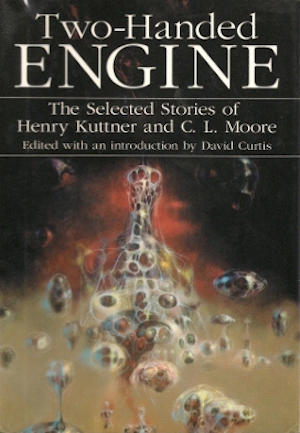
Henry Kuttner (April 7, 1915–February 3, 1958) and C. L. Moore (January 24, 1911–April 4, 1987) were both well-known authors before their mutual friend Howard Lovecraft introduced them. Once they married, they were a powerhouse writing team. Because they often collaborated, and because they sold the resulting works under whichever of their many bylines seemed most suitable, due credit for specific pieces can be difficult to establish. Thus it makes perfect sense to give them a joint award. My personal favourite of their collections is Two-Handed Engine, but it seems to be out of print. Look for the reprints of The Best of Henry Kuttner and The Best of C. L. Moore.
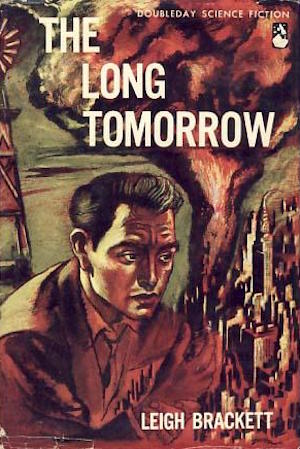
Leigh Brackett (December 7, 1915–March 18, 1978) was lauded for her planetary adventures (she moved her Eric John Stark adventures to the extra-solar world Skaith when space probes rendered her pulp-era Solar System implausible) but that was only one aspect of her work. In addition to writing SF and mysteries, she was a successful script writer. Her credits include The Big Sleep, Rio Bravo, The Long Goodbye, and an obscure little film called The Empire Strikes Back. Her planetary adventures tended to be long on action and short on clear moral boundaries. I am particularly fond of her post-apocalyptic The Long Tomorrow. Readers interested in her planetary adventures should look for the recent reprints of The Ginger Star, The Hounds of Skaith, and The Reavers of Skaith.
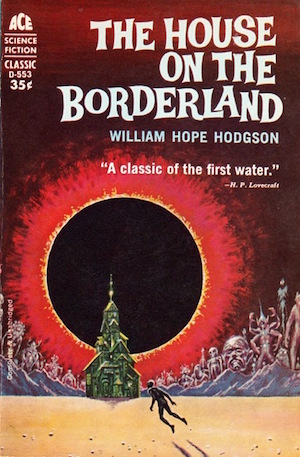
William Hope Hodgson (15 November 1877–19 April 1918) predated today’s formalized genre boundaries. One might think of him as working somewhere in the intersection of weird fantasy and cosmic horror. His best known works are the dying-Earth horror novel The Night Land and the hallucinatory The House on the Borderland. You may never have read either, but odds are you’ve read works influenced by one or the other. Hodgson died at Ypres, during WWI; hence several of his works are public domain and available at Project Gutenberg.
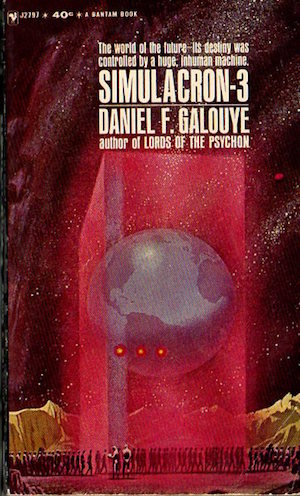
Daniel F. Galouye (11 February 1920–7 September 1976) was a journalist until health issues forced his retirement3. He was prolific. Many of his stories feature protagonists with unrealized potential and nowhere near enough information about their circumstances. His Counterfeit World AKA Simulachron-3 (filmed as The 13th Floor) seems the obvious starting point. A few of his works are available at Gutenberg.
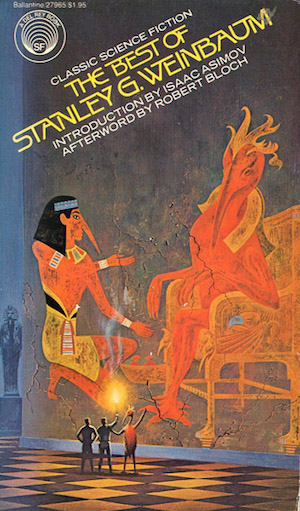
Stanley G. Weinbaum (April 4, 1902–December 14, 1935) died of cancer only eighteen months after his debut story A Martian Odyssey saw print. Although he dabbled in super-science, he seems to have by and large played fair with his readers. His oeuvre may be as close to hard SF as one might find in the 1930s. I recommend the ebook reprint of The Best of Stanley G. Weinbaum.
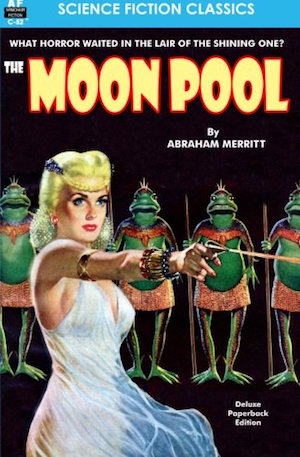
A. Merritt (January 20, 1884–August 21, 1943) found time during his active journalism career to pen eight science fantasy novels and an assortment of short stories. Readers curious about his vivid alternate worlds and, um, energetic prose could start with his classic The Moon Pool, available on Gutenberg.
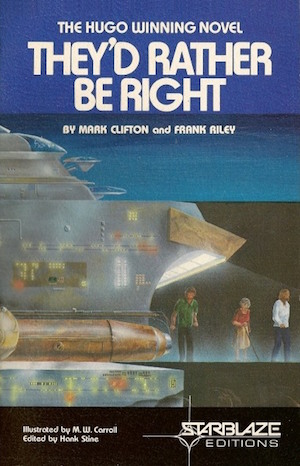
Industrial psychologist Mark Clifton (? 1906–November 1963) may be best known for winning the second Best Novel Hugo for They’d Rather Be Right, of which the less said the better. Much of his output focused on either the supercomputer Bossy (wise but distrusted by humans) and the Ralph Kennedy psionic tales. The story I’d suggest to anyone whom I didn’t actively dislike is the sentimental “Star, Bright,” whose view of super-kids is charmingly unhorrific. If you’ve annoyed me recently, then by all means track down They’d Rather Be Right.
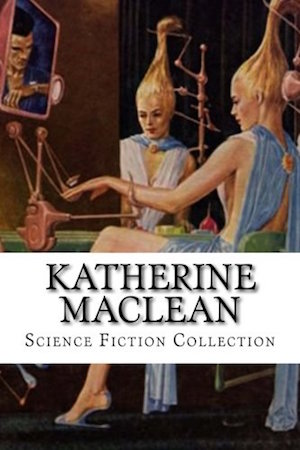
Although Katherine MacLean (January 22, 1925–) has written novels, it was an early flurry of short pieces (most published in the 1950s) that drew her to SF readers’ attention. Stories of particular note include “The Snowball Effect,” about sociological research that proves all too successful, “Pictures Don’t Lie,” about believing one’s eyes, and “And Be Merry,” in which a woman struggles with the terrors of immortality. There are many other MacLean stories worth reading. Alone of the names on this list, MacLean won the Rediscovery while still living. Although she has not published in the last generation, she is still alive and may yet break her silence.
As Samuel R. Delany has pointed out on Facebook, MacLean is an ideal candidate for Damon Knight Memorial Grand Master, which is given only to the living. Speaking for myself, I implore the SFWA to consider her for this award.
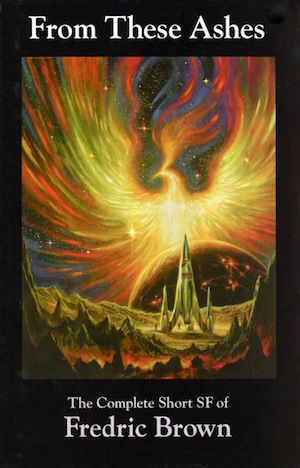
Fredric Brown (October 29, 1906–March 11, 1972) was, as previously discussed, a master of the short-short story, although he hardly restricted himself to that form. Readers interested in his novel-length material could look for his alternate universe comedy What Mad Universe, although I would lean more towards suggesting NESFA’s From These Ashes: The Complete Short Science Fiction of Fredric Brown.
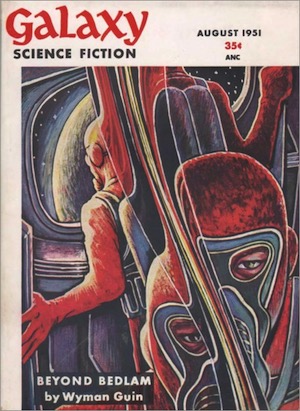
Wyman Guin (March 1, 1915–February 19, 1989) is one of two authors who have won the Rediscovery whose work I have not managed to track down. Aside from his association with Galaxy Magazine, I know little about his fiction. Alas, he seems to be very, very thoroughly out of print.
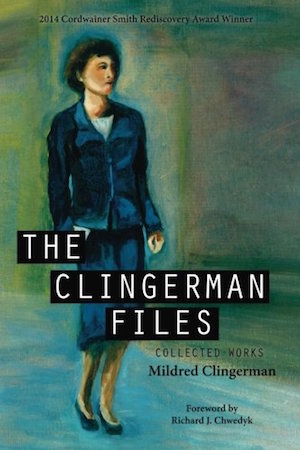
Mildred Clingerman (March 14, 1918–February 26, 1997) is the other author in whose work I am not widely read. It’s not for lack of trying, because I’ve seen her work referenced favourably over the years. But! In the interval between writing my review of the Rediscovery Award Anthology I wish existed and composing this essay, The Clingerman Files was published. Not only does it contain her previously published work, it also includes some pieces previously unpublished. A copy is even now headed my way.
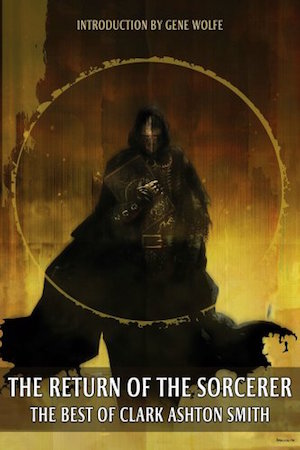
Clark Ashton Smith (January 13, 1893–August 14, 1961) was a mainstay of Weird Tales in the era of Lovecraft, Howard, and cover artist Margaret Brundage. Smith’s vivid, gleefully morbid tales featured protagonists not destined for long lives. But then, who would expect longevity for characters who proclaim
I am now at work on an apparatus by means of which, when it is perfected, I hope to manifest in their essential purity the radiations of malign force.
I can see no way in which that could go horribly wrong…
Readers new to Smith might consider Prime’s The Return of the Sorcerer.
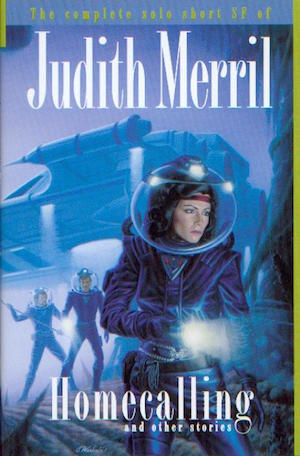
Writer, editor and activist Judith Merril (January 21, 1923–September 12, 1997) was a member of the Futurians, a fellowship of writers, editors, artists, and fans whose collective efforts guided science fiction away from Campbell’s narrow vision. Her noteworthy fiction includes the disturbing “That Only a Mother,” the co-written military SF novel Gunner Cade, and the post-holocaust Shadow on the Hearth. Readers new to Merril should look for a copy of Homecalling and Other Stories: The Complete Solo Short SF of Judith Merril.
Despite her accomplishments as a writer, it’s her role as an editor for which Merril is best known. Her variously titled The Year’s Greatest Science Fiction and Fantasy/Annual of the Year’s Best S-F ran from 1957 to 1968, followed by two Best of the Best volumes in 1970. Although there have been many Best SF annuals, Merril’s stood out for the breadth of the net she cast, drawing stories from well outside the usual borders of science fiction. She is to date the only woman to helm a best SF annual solo4.
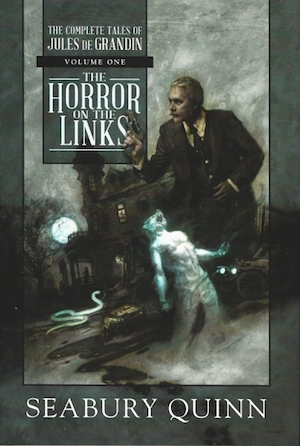
Seabury Quinn (January 1, 1889–December 24, 1969), first published in 1917, was a prolific contributor to Weird Tales (a magazine of which the judges for this award appear quite fond). Occult detective Jules de Grandin featured in many of them, enough to fill all three volumes of The Complete Tales of Jules de Grandin (Horror on the Links, The Devil’s Rosary, and The Dark Angel.).
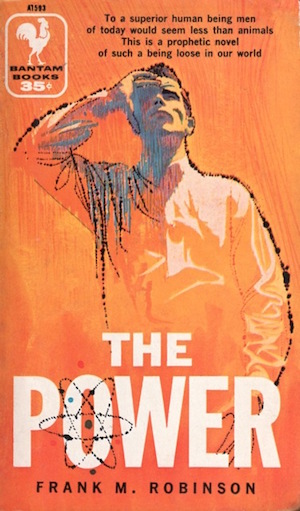
Activist Frank M. Robinson (August 9, 1926–June 30, 2014) in no way limited himself to writing fiction (his political activities won him a spot in the Chicago Gay and Lesbian Hall of Fame). Even his role in SF was wide-ranging…and long-lived. His sixteen novels ranged from psionic thriller The Power to the generation ship Bildungsroman The Dark Beyond the Stars. With Thomas Scortia he was author of several successful thrillers, ranging from The Glass Inferno (which contributed to the ensemble disaster film The Towering Inferno), The Prometheus Crisis, The Nightmare Factor, and The Gold Crew.
Who will be the next winner of this award? Not being a judge, I couldn’t say. But I am very curious to find out.
1: Unfortunately the Cordwainer Smith Foundation site stopped updating their list of Rediscovery winners in 2012 (although Wikipedia keeps a list), because, if I understand a recent email exchange correctly, they thought File 770 was preserving information about the award. While File 770 does report on the award (and is where I got the list of judges), this is simply part of their general news reporting activities.
2: Readers may find the 1976 Vallejo cover a bit risqué. Surprisingly enough, it is true to the text—save for one detail. Davy is wearing cut-offs. In his time, such tailored trousers are a lost technology. Consider how much technology had to be lost for that to be true.
3: A fair fraction of Rediscovery winners enjoyed short lives, whether thanks to the lingering (or in the case of Hodgson, immediate) effects of military careers or to simple bad health.
4: Paula Guran has published two Best-of anthologies that cover both SF and fantasy. Forty-seven years passed between Merril’s final Best-of and Guran’s first.
In the words of Wikipedia editor TexasAndroid, prolific book reviewer and perennial Darwin Award nomineeJames Davis Nicoll is of “questionable notability.” His work has appeared in Publishers Weekly and Romantic Times as well as on his own websites, James Nicoll Reviews and Young People Read Old SFF (where he is assisted by editor Karen Lofstrom and web person Adrienne L. Travis). He is surprisingly flammable.










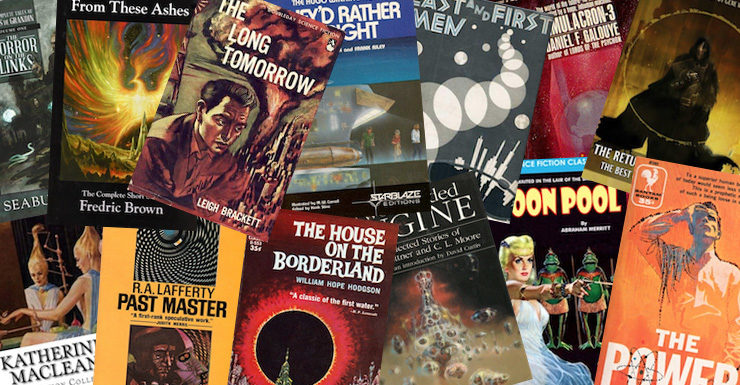
I nominate Jack L Chalker. The SF Author who did much to make LGBT issues visible in the SFF community. Virtually every single one of his books featured either a gay character, or a gender divergent character, and while he might have only done it to chase the fetish market the simple fact that those books got stocked on the SF shelves in stores in libraries, instead of the LGBT fiction shelves that the straights avoided, meant that a whole raft of fans and readers got exposed to LGBT protagonists who wouldn’t otherwise have encountered them. He helped bring LGBT issues into the mainstream. Some of his books were a bit naff, but others like the Rings of the Masters, or The Changewinds series, dealt with some seriously high concept stuff.
He deserves to be remembered more.
Tom Scortia turns up in Tuckerized form in Heinlein’s “Double Star” (though the character called “Doctor Scortia” is later called Doctor Capek – possibly indicating that Heinlein changed his mind about the Tuckerization, and missed one instance). At least some of Guin’s work is available on Archive.org – “Beyond Bedlam” is a classic Galaxy style “what if.”
How about Chan Davis for Rediscovery (hey, Chan Davis is still alive!)
I remember Judith Merril from the short commentaries she would do on TVOntario in the late 1970s after each episode of Doctor Who (early Tom Baker). She could relate concepts from each episode to wider themes in fiction or science. I have to give her some credit in why I became so interested in the series.
She also created a huge collection of science fiction writings which eventually would up part of the Toronto Public Library, named in her honour.
I’m having trouble figuring out why half of these authors needed to be “rediscovered”. While I bet not many have actually read Stapledon (I confess, Starmaker is still waiting for me–I own it), surely almost every SF reader has heard of him.
I read They’d Rather Be Right this year, and … the less said the better.
I reread Brackett’s “Eric John Stark” novels last year, and not for the first time.
Moore & Kuttner, Clark Ashton Smith, Merril, Lafferty, and to a lesser extent, Brown have all been visible in bookstores.
Chalker, otoh, needs to be forgotten. Yeah, sure, I own a LOT of his, but I can’t see that he did any service to the LGBT community by focusing on his own prurient interests.
My pick would be William Tenn (Philip Klass).
Pangborn was GoH (Ghost of Honor) at the most recent World Science Fiction Convention.
I would pick A. Bertram Chandler. He was a merchant marine sailor who emigrated to Australia and wrote using his experiences as a sailor and ship commander. John Grimes was his most famous character.
Moderan by David R. Bunch will be reissued on September 11. New-metal men with one strip of flesh to show they’re still human live in Strongholds and fight endless wars with each other. The only previous edition of this collection of interconnected short stories was published 47 years ago, but the stories remain fresh and very relevant. Bunch is definitely a writer that needs to be rediscovered.
Others have asked why some of these writers are on this list. I would have to ask why Fredrick Brown was considered to have been forgotten… his “Arena” was the basis for a great episode of Star Trek… though in very modified form.
Future honorees? I never hear anyone talk about Clifford D. Simak any more.
Next time you’re at a con where there are people under fifty, ask them if they know any of the names on the Cordwainer Smith Rediscovery list. The odds are not bad that you will be unpleasantly surprised.
Although he has not won a Rediscovery (yet?), Simak’s not a bad example: well known enough when he died in the 1980 that my local paper reported his death even though he wasn’t from around here and the Record doesn’t particularly care about SF writers. A decade later, I discovered not only was he pretty much out of print, but book stores had no idea who he was.
Hmmm … Most of the authors I’d like to see getting more attention (Louise Cooper, Jo Clayton, Jane Gaskell, Michael Shea) probably fall more into the good-but-not-great side of things.
A few years ago I would’ve mentioned Tanith Lee, but these days much of her work is back in print thanks to DAW.
(I am also slightly sad because while I do recognize almost all of the names on the Rediscovery list, I am no longer under fifty.)
Clayton seems to be coming back into print, courtesy Open Road Media.
Eric Frank Russell ….
I wish that there was an imprint bringing long out-of-print SF/F novels back, the way Hard Case Crime does with long out-of-print crime and noir novels.
@12 — Open Road did a couple of Clayton’s trilogies and the first five Diadem books, but I haven’t seen anything else in quite a while now.
@14 There is such an imprint, it’s just not in the US. Check out Gollancz’s SF Masterworks list.
M.P. Shiel, author of The Purple Cloud (1901).
Trying to define “forgotten” is like trying to define “underrated”. It depends fully on your personal context and assumed knowledge of “conventional wisdom”.
I don’t follow SF awards well enough to know whether these have been more widely awarded, and therefore aren’t eligible for this particular “honor”, but I imagine that many readers of today have forgotten, or more likely have never come across in the first place, some of the ’70s stalwarts like Roger Zelazny, Vonda N. McIntyre, Gordon R. Dickson, and Keith Laumer.
John M. “Mike” Ford. ’nuff said.
Has it really been a generation since McIntyre’s most recent novel?
(I was astounded when I went to review it to discover that Zelazny’s Doorways in the Sand was out of print and had been for decades. It’s back in print, courtesy Farrago.
Tom Reamy was a very promising author in the late 1970s whose career was cut short by Author Existence Failure. Ditto Robert Stallman.
Doris Piserchia is still alive, as far as I know, but her career was derailed by personal tragedy.
I always liked E.E. “Doc” Smith. His circus of the galaxy series was cool.
Perhaps, Tim Powers (still alive). Not all of the works are great, but I can say that “The Stress of Her Regard” and “On Stranger Tides” (only marginally related to film with same subtitle ) are 2 books I wish I had not read, just to again experience the pleasure of reading them for the first time. I’m odd.
Wyman Guin may be SF’s best example of the One Hit Wonder. There’s “Beyond Bedlam” and … nothing else, really. One novel and one short story collection that one couldn’t even find in the dealers room at Readercon the year he had won the award.
I wadi was pleasantly surprised to discover that only Mildred Clingerman appeared new to me— though I have read a huge number of the old magazines— including the entire fifties of Galaxy.
I’d definitely add Eric Frank Russell, as well as Simao and Chandler though I’m somewhat surprised to see who’s out of print these days
Tom Rainbow is another fellow who died too young http://www.isfdb.org/cgi-bin/ea.cgi?12242
Ted Reynolds is still alive I think – I loved his stuff back in the day http://www.isfdb.org/cgi-bin/ea.cgi?232
Joan D. Vinge. In this day and age it’s incredible how books like “The Snow Queen” or “Psion” are forgotten.
Eric Frank Russell is published by NESFA Press, resurrectionists to the SF community, in two volumes, “Entities” which contains five short novels and “Major Ingredients” which has thirty short stories, together making up a good representation of his life work.
Another name that springs to mind as sadly neglected today although influential in his time is John Brunner. Also from the RightPondian world of SF there’s Keith Roberts.
@23 Wyzyrd
I thought “Declare” was amazing.
Some good names mentioned so far. I’d add Mack Reynolds. Possibly also JF Bone, who I’d never even heard of until recently.
If people know Mark Clifton, it’s unfortunately because he wrote what is widely considered the worst Hugo-winning novel ever.
@5 Count me as another fan of William Tenn, a marvelous author.
I had never heard of this award, so perhaps this article might also have been titled: “What is the Forgotten Award of Science Fiction?”
The late, great, recently departed Julian May is not nearly as well remembered as she deserves to be. Her nine book cycle that encompasses a trilogy, a quarter, and a duology deserves to be better remembered than it is.
The quartet is The Saga of the Pleiocene Exile.
The duology is The Intervention.
And the trilogy is The Galactic Milieu.
You can start reading with the quarter OR the duology because this truly is a cycle.
T.J. Bass. He only wrote two books but I thought they were amazing when I read them many years ago. The sort of books that imprinted onto young me and sometimes still crop up in my thoughts. They were pretty unique books too, I thought.
Like a lot of people have pointed out – these authors are not at all forgotten – and in some cases, they are not even obscure.
So, they are remembered better among the over-50s? Well, fashions change.
Some of these writers will still find readers in 200 years, when many who are popular now will be forgotten forever.
Re: Mark Clifton and @auspex: “I read They’d Rather Be Right this year, and … the less said the better.”
Everybody says that… and that’s it. This perhaps extends it’s mystique. But WHY is it bad? It’s like asking for a review of a film and getting “It sucked.” A little more articulation… maybe a 3-word review?
Arkham House and August Derleth published many unknown authors saving HP Lovecraft from being lost to history.
@35: How about: it really sucked for your 3-word review?
A longer answer can be found with a quick dive into Wikipedia:
And later in the article:
Leigh Brackett may have avoided clear moral statements in her work, but The People of the Talisman (1964) has a very blunt feminist statement in a genre not known for them at the time.
Mark Clifton also produced two solo novels, both of them good — and both sardonic in ways I wish were obsolete.
Those who don’t like current milSF should not be misled by your applying that term to Gunner Cade; it’s obvious in the beginning that the soldiers are horribly mistaught, and most of the book involves the title character walking away from the military.
@23: Powers is not prolific, but he is far from forgotten — helped by having out both a new novel and a collection of short works in the last year or so. But I agree about wanting to again read his work for the first time; I remember how Declare blew my mind. He’s also noteworthy as possibly the only Laser Books author to win a major award (World Fantasy Awards for both Last Call and Declare); most of them are deservedly obscure.
@28: Brunner was recipient a few years ago of Readercon’s own resurrectionist recognition, the Memorial Guest of Honor post.
The Unparalleled Adventure of One Hans Pfaall, by Edgar Allan Poe. June 1835.
Considering how old this story is, it’s incredible that an author traditionally known for horror could create a piece like this. Poe had tremendous depth.
@8 A few of the Moderan stories were published in Ann & Jeff Vandermeer’s recent Big Book of Science Fiction too, so it might be safe to say Bunch is making a comeback. I for one simultaneously loved and was confused out of my mind by those stories. I think a re-read might be in order.
And my own nomination for this list is Sylvia Engdahl, who wrote some brilliant YA SF novels in the 1970s. Firebird Books (RIP!) reissued her Enchantress from the Stars, Journey Between Worlds, and The Far Side of Evil about ten years ago, but I haven’t seen them since Firebird folded. The Far Side of Evil is particularly striking – dark (surprisingly dark for a YA novel, especially one written in the ’70s before waterboarding was “in”), vivid, anxious, and very political, and it makes use of a fascinating social theory called the “Critical Phase,” which our own society might be coming to very soon. Engdahl’s also notable for writing cyberpunk-like literature before the genre really had the ability to develop.
Forgotten greats, forgotten pretty goods, I don’t care. I love articles like this to remind me of books and authors I’ve not read for a while, and want to read again, with the added bonus of those authors I never got around to.
@37. JReynolds: Sure, thanks for that. Langford’s comments are better than the dismissive norm. It’s usually the “it’s the worst, it’s terrible…” type of generic response without saying what’s so bad about it. Perhaps it should be taught as a cautionary tale.
@32 Intervention isn’t a duology, it’s a single novel that was split in two for US publication for markerting reasons. It was published as a single volume in the UK.
I think people who are currently a) alive and b) writing novels that are c) in print should get disqualified from being classed as “forgotten greats”! Tim Powers is great and more people should read him, but he isn’t forgotten. (Tip for readers: don’t read Declare first because it’s his best book and you’ll want to read all his other stuff afterwards and the rest, though good, isn’t quite as good as Declare.)
And, yes, a lot of these are in the very good SF Masterworks list. (There is also a Fantasy Masterworks list and a Crime Masterworks list, by the way.)
@40 I first came across mention of Moderan in Brian Aldiss’ Trillion Year Spree. Aldiss seemed sad it was no longer in print and had been largely forgotten. I found a copy of Moderan and I was amazed at how much Bunch could pack into a very short story. I agree that the stories in Moderan will support multiple re-readings. I hope Bunch’s other stories will also find their way into print.
Is Edmund Cooper forgotten? Or Richard Cowper? Or the early novels of Christopher Priest? (A Dream of Wessex)
These are the English SF authors of 60s and 70s alongside Keith Roberts and John Brunner
What about Theodore Sturgeon?
H Beam Piper (Space Viking – old fashioned but interesting)
Donald Kingsbury (Geta/courthip rite)
I nominate the Morgalla books. More fantasy but it has some ties to sci fi.
There are a few paperbacks by Wyman Guin offered by sellers on eBay, as well as that issue of Galaxy.
I think Murray Leinster deserves a place in these awards.
I would like to nominate Lloyd Biggle Jr. for consideration. In the 70s I read his Jan Darzek stories in my school library and I think only “Monument” is still in print.
@18 sardinicus Zelazny’s Amber Chronicles are possibly coming to TV in the near future (fingers crossed), which would bring his name back into prominence; supposedly the creators of The Walking Dead are involved. I would nominate Fletcher Pratt (and maybe his sometime-writing partner L. Sprague de Camp), and oft-mentioned above Simak. Also, Doris Piserchia, who while still alive, only had about a 10-year writing career that ended in ’83.
@46: all of Sturgeon’s short work was assembled into ~10 volumes, with extensive notes, over the earlier years of this century, and he was Memorial GoH at Readercon while this was going on; I think it will be a while before he’s forgotten.
@43: You’re right that Intervention is a single book — but I recall it in that format in hardcover in the US also; the 2-book format was for the mass-market paperback, just as Cyteen was done as 3 mmpbs.
@19: certainly more people should know Ford — although some may find it frustrating that he never did anything twice. (One bildungsroman, one alternate-history medieval fantasy, one semi-hard science fiction, one proto-cyberpunk, two original-StarTrek books but one was a drama outside the canonical time and the other was a farce, ….) There are two collections of his short fiction, but AFAICT they’re both out of print — although as hardcovers they’re more likely to survive.
John Sladek. Pretty much all his SF has been brought back into print in Gollancz’s SF Masterworks series, but he’s still almost unknown in his native land (try searching for his name on this very site). At least as funny as Sheckley, by far the most literary of the New Worlds set (I include Ballard and Delany), and philosophically intriguing. What’s not to like/revive?
You guys totally forgot Robert F. Young.
People often forget Lord Dunsany’s King of Elfland’s Daughter, but it clearly had a huge impact on early fantasy authors like Tolkein and definite influence on authors like Gaiman.
Yes, people who like Lafferty like him a lot.
There’s a facebook group
https://www.facebook.com/groups/eastoflaughter/
and a yearly get-together.
http://www.laffcon.org/
Have a little Lafferty– when I first read this story in the sixties, it just seemed whimsical. Now it seems prescient.
https://www.baen.com/Chapters/9781618249203/9781618249203___2.htm
As for what’s forgotten and what isn’t, I remember talking with fans at conventions who hadn’t heard of Bujold back when she was winning Hugo after Hugo. Let’s keep recommending books to each other.
Joan Slonczewski. She doesn’t seem to be very famous and well remembered, even though she wrote one of the biggest classics of feminist science fiction.
How remembered and still famous is Catherine Asaro? She is one of my favorite authors, and she released a new novel last year to considerate success, but she doesn’t seem to be discussed much among science fiction fans.
Galouye’s Counterfeit World/Simulachron-3 is unusual (though no longer unique among sf novels) in being filmed twice. The first time was a two-part made-for-tv version entitled Welt am Draht [World on a Wire], directed by Rainer Werner Fassbinder in 1973. It’s apparently very good. (I liked The 13th Floor a great deal but have never sought out the prose works.)
I’m nominating James White, (1928 – 1999) whose Sector General books are well written and have a unique setting. In addition, his novel Escape Orbit was short listed for a Nebula. Maybe he’s too new, but would be a good choice.
I just bought a copy of Wyman Guin’s Living Way Out a month ago. I was befuddled by its very existence. Who the living heck was Wyman Guin, I thought? I felt like reality had been pulled out from under my feet. Haven’t read it yet though.
Cordwainer Smith
Clifford Simak
Fritz Leiber
Eric Russel
Chip137 @38:
Dean Koontz published Laser Book #9, Invasion, under the pseudonym Aaron Wolfe. He was named World Horror Grandmaster in 1996. Other Laser writers of note include Jerry Pournelle, K.W. Jeter, George Zebrowski, and of course Piers Anthony. The books weren’t good, but the writers were a reasonable selection from the mid-1970s writing pool.
A.E. Van Vogt wrote a lot of interesting books and a few massively influential ones (The Voyage of The Space Beagle, 1950.) He’s unfortunately mostly out of print. It would be great if someone took an interest in re-releasing his work as epubs.
I’m astonished at some of the ‘deserved mentions’ listed – Simak? (early work, anyway – I found some of his later more fantasy-oriented works wearisome), Vonda McIntyre, Joan Vinge, Zelazny! However – I thoroughly agree that Eric Frank Russell should be there.
Part of my bafflement is that once I’ve found an author I like I tend to collect the books – and then I used to keep them to reread later, so they were always available. It’s only in the last few years when I’ve been separated from my collection that I’ve realised how authors have gone out of print. (Some of course deservedly so but others for no obvious reason. I’m not fond of much of his work but most of Heinlein’s books seem inordinately hard to come by – so I was cheered by the recent announcement of a new edition of The Moon is a Harsh Mistress… ).
I’d add support to the Gollancz MasterWorks series (all three of them). And David Langford’s critiques/reviews are always at the very least readable and often thought-provoking.
A PS – I was astonished, when reading Richard Cowper’s obituary (2002) to learn his real name – and that of his father and his slight connection with Katherine Mansfield.
I have a collection of the Quinn titles in paperback. I enjoyed every single one of them.
I used to feel well-read, but found this comments section and realized I’m unlettered.
I consider Fredric Brown’s ‘What Mad Universe’ to be the funniest book I have ever read – even funnier than P.G. Wodehouse. Mind you, it caters to a rather sophisticated taste in humor… to quote:
*******************
He floundered. “I mean, is it so hot in a spaceship that such an – an abbreviated costume is necessary? Or what?”
“I don’t know what you mean. Of course it isn’t hot in spaceships. Mostly we wear heated plastic coveralls.”
“Transparent plastic?”
“Naturally. What are you getting at?”
********************************
Everything has an utterly, crushingly logical explanation in the end…
I agree on H. Beam Piper (note John Scalzi’s 2011 re-telling in Fuzzy Nation). Others:
Lee Killough
Barry Longyear (Enemy Mine, among others)
Barry Hughart (stories of Master Li and Number Ten Ox, set in “an ancient China that never was”)
Can Zelazny’s works be considered SF? It depends which sciences we are talking about. It is true, however, that his name and output are largely unrecognized by the modern readerdom, despite encapsulating most of ideas, explored in the field nowadays, and being of remarkable artistic merit.
@28, John Brunner was the first name I thought of when I read the headline. His novels Stand on Zanzibar, The Sheep Look Up, The Jagged Orbit and The Stone That Never Came Down are arguably the first cyberpunk novels. Some of their conceits date badly (their treatment of women, for one), but the central ideas (a cynical look at the future, our tendency to worship technology, multinational corporations more powerful than any government, even the rise of the Internet) are as relevant today as when the novels were first published.
Barrington J Bayley.
Garments of Caean.
Zen Gun.
Wow, I have three. Clifford Simak, Keith Laumer, and Robert Sheckley. Simak and Laumer were my introduction to SFF. Later on I discovered Sheckely and he turned into one of my favorites for his sense of humor.
No Chandler, Simak, Nourse, E.E. “Doc” Smith? No de Camp, van Vogt, Brunner, or Sheckley? How about Cordwainer Smith?
Smiles are VERY important to me and my early SF reading letting me know it was possible to combine elements of the fantastic with laughs and grins. When I think of Henry Kuttner’s Robots Have No Tails collection of Gallegher stories and Eric Frank Russell’s Space Willies (aka Next of Kin, and it was an expansion of a great short, Plus X), I’m immediately the golden age of 13, reading and laughing out loud, not caring a whit about anybody seeing that fool in the corner convulsing. Kuttner, is, of course, inseparable from his wife, C. L. Moore. If you want a trio, then add Fredric Brown for Martians, Go Home. And I’d sneak Lafferty (just ahead of Laumer) in as a fourth for the best dinner party of all time.
Loved Leigh Brackett, H. Beam Piper, Mack Reynolds and A. Bertram Chandler. Fitting them all in around Andre Norton, Edgar Rice Burroughs and Robert Heinlein was a tough job, but one I enjoyed thoroughly back then. I thought enough of Doc Smith that I used one of his character’s catchphrase as a chapter title in my first book.
The two MISSING names, as far as I can tell, are (fellow Canadian) Gordon Dickson for the Dorsai books, and maybe I should also toss in Lester Del Rey, who’s Nerves is the greatest unfilmed thriller EVER!
If mentioning authors and a single title of note seems more book-awardish rather than ‘lifetime achievement award contention,’ then I’ve done them a injustice. Trust me, the books I’ve noted are just a start.
@71, the Brunner novels you mention don’t have much of a cyber element. The one which does is The Shockwave Rider.
Whether it is scifi or horror or something else, I think we have to add Manley Wade Wellman. I never hear anyone talk about him anymore and he wrote some amazing fiction. Most important, at least to me, were his John the Balladeer stories and novels.
Whether they’re great or not is more a collective judgment call than it is some sort of absolute truth. Trying to separate unremembered from out of print, related but not identical conditions, I offer for your consideration:
Lloyd Biggle
F M Busby
Sheri Tepper
.
John Wyndham.
I used to have the John Wyndham Omnibus, containing Triffids, Chrysalids, and Kraken. Genetic engineering gone wild, nuclear war, religious fundamentalism, new strains of humanity, melting ice caps and sea level rising… great, wonderful, sweeping themes, despite Aldiss’ dissing. Gave permission to Jefferson Airplane to use lines from The Chrysalids in their revolutionary rock. I guess his legacy is polluted by the awful film version of The Day Of The Triffids, but he deserves much more recognition.
I also still have a battered copy of Simulacron-3, which presaged cyberpunk in 1963. Movies like The Matrix and Dark City owe Galouye credits. And now scientists are seriously discussing whether we live in a simulation.
I always put in a plug for Wilmar Shiras and her excellent and well recognized story “In Hiding.” Just a beautifully told sci-tale of a psychiatrist consulting with a normal-seeming pre-teen and figuring out that something strange is going on. I liked her later work Children of the Atom but others have noted the possible appearance of the Suck Fairy on re-read.
E. B. Cole certainly belongs in the list.
Ditto Eric Frank Russell.
Ditto a host of others.
No love for Avram Davidson?
Edward Llewellyn’s “Salvage and Destroy” is a favorite of mine.
John C. McLoughlin’s “The Helix and the Sword” is an amazing and little-known work.
Donald A Wollheim, under his “David Grinnell” pseudonym, wrote a little pulp novel called “The Edge of Time” that’s hard to find, but excellent to read. The Kelly Freas cover is hauntingly beautiful.
Everything by H. Beam Piper. NOT John Scalzi’s misunderstanding of Little Fuzzy, however. I’m sorry, he missed the point while so busy changing the politics all around upside down and sideways.
I once corresponded with Jack Chalker about his predilection for cross-gender transformations. He admitted it fascinated him, but denied any overt LGBT leanings or personal concerns. Of course, he might simply have been denying it to deny it, but I don’t think he had any negative feelings towards the LGBT. If anything, he didn’t bear them any ill will but maybe was a bit to fascinated with his own interests to actually look at how it actually existed in the real world. I don’t think it was malicious, just a case of tunnel vision.
I adored Stephen Tall’s books “The Stardust Voyages” and “The Ramsgate Paradox”. His use of a power-metal called “timonium” was homaged in Sharon Lee and Steve Miller’s “Liaden Universe” books. I understand they knew Stephen Tall quite well, and it was a deliberate homage. The name was, of course, taken from a town in Maryland. I used to visit it once a year for a particularly good Amateur Radio “Hamfest”.
Cordwainer Smith, because, well, *Cordwainer Smith*. Nothing more needs be said.
Edmund Cooper wrote a series of pure escapism novels, “The Expendables”, under his Richard Avery pseudonym. They’re fun and vapid and I adore them. I could tell they were written by Cooper because the style was practically identical to his book “The Tenth Planet”. Idris Hamilton was damned near a carbon copy of Commander James Conrad, and the spaceships in his universe were the only ones I know of to use a titanium-clad plastic landing torus, pressurized with helium, as landing gear. It was quite ingenious. And I will always honor Cooper for the creation of The Gagarin Cup.
A. A. Attanasio, for his “Radix Tetrad”. The final book in the series, “The Last Legends of Earth” is a dear and poignant old friend, one of my “feel-good” books. The audiobook is amazing.
Julian May’s works. They are GLORIOUS. I wish they’d redo the audiobook of “The Many-Colored Land” with a narrator who can bloody READ, so they’ll get good enough ratings and interest that they’ll do the REST of the books as audiobooks. The first one was so awful, I think they declined to make the rest out of shame. (When you pronounce “metapsychic” as “metaPHYSIC” for half the book, you aren’t paying ATTENTION.)
Barbara Hambly’s wide-ranging books.
Katherine Kurtz, both for the Alaric Morgan, the Deryni and for Sir Adam Sinclair, the Adept.
Michael Scott Rohan, for Elof the Mage-Smith.
There’s just so MANY…and so many that have been lost or forgotten.
Gollancz’s SF Masterworks (and its now-defunct Fantasy Masterworks) imprint does, as is mentioned above, reprint works by those great authors whose work is otherwise sadly missing from modern bookstores (in my local bookstore, most of the Clarke/Asimov/Heinlein novels are SF Masterworks; otherwise, they seem forgotten in favour of multi-volume fantasy series, many of questionable quality).
If you can find a SF specialist bookstore you might also come across Gollancz’s Gateway Omnibus Editions, which are big yellow volumes typically reprinting three or four novels by the same authors and other half-forgotten masters, including Edgar Pangborn, Edmund Hamilton, Michael Coney, Richard Cowper and so on.
A. E. Van Vogt, though, doesn’t have a book in either list. Given his one-time popularity (at a level with Heinlein, Asimov and Clarke) and influence (in particular on Philip K. Dick, but also there are many similarities between one of his stories and the movie Alien), this strikes me as astonishing.
These lists are great. For those of you who argue against the “forgotten” label, I’ve been reading almost exclusively sf/f for the past 30 years — and following Tor.com religiously for the past decade — and have never heard of any of these authors, except Leigh Brackett. Some of us starting reading in the 90s, y’all.
So, many thanks to you, James!
Also, thanks @27– I just read a reference yesterday on Tor to Joan D. Vinge’s The Snow Queen and had never heard of her before, either. Looking forward to trying these new authors.
You say in this posting that you have not come across stories by Wyman Guin. I have a copy of The Omnibus Science Fiction, edited by Groff Conklin, that includes a story titled “Trigger Tide” written by him. I have a lot of anthologies but that’s the only story I have by Guin.
If I may suggest that James H. Schmitz. His work foreshadows the strong female protagonist fiction that has become a mainstay today. I have always found his stories complex and engaging.
@Ajay
I agree Tim Powers can’t really be considered “forgotten”. Heck you can follow his author page on Facebook – folks with books published this year and thriving FB pages are not forgotten. But I disagree on his “best” book. Declare’s very good, don’t get me wrong, but I think any one of the trilogy (Last Call, Expiration Date, or Earthquake Weather takes top billing. The Drawing of the Dark would be my entry (“read this one first”) choice. It’s very accessible (light reading really) and a fan/cult(ish) favorite.
As for forgotten, how about Lucius Shepard? I really wish he was wider read.
Where to begin: I first read Heinlein ‘s Between Planets, later Eric Frank Russell’s Wasp. Read all the Winston Juveniles including Lester Del Rey, Raymond Jones, Milton Lesser, Chad Oliver, and even Ben Nova towards the end. Andre Norton, Murray Leinster and Doc Smith were favorites! On to Ace doubles where among my favorites were John Brunner, Ken Bulmer, A. Bertram Chandler, A.E. Van Vogt. Too many favorites from my youth. Oh well.
What about Walter Millar – possibly a one trip pony but his “A Canticle for Leibovitz” remains one of the most memorable books read over my past 60 odd years. Also James Blish and his moral tales – “A case of conscience” and “ Black Easter“.
Elizabeth A. Lynn
Have The Snow Queen and The Summer Queen not been reviewed on tor dot com?
Weinbaum FTW! The first story of his story I ever read was Parasite Planet in an anthology of pulp sci-fi I found at the library I loved that while the story wasn’t the strongest, the richness of detail was amazing.
@88, I just love the Drawing of the Dark! Also James H. Schmitz. My copy of Agent of Vega is literally falling apart.
I’ve read a lot of this list, mainly because I’m old and because I ploughed through a library or two of old paperbacks in my youth.
The thing that saddens me is that the horribly distorted US copyright laws (golly gee, thanks, Mickey Mouse!) have put most of these out reach of anthologists until way too late to be relevant.
We really ought to be able to have access to many of these works in the public domain by now, and e-publishing makes the cost of keeping a work “in print” negligible.
Zenna Henderson certainly belongs in this group.
https://www.amazon.com/Ingathering-Complete-People-Stories-Henderson/dp/0915368587/ref=sr_1_1?s=books&ie=UTF8&qid=1536284584&sr=1-1&keywords=zenna+henderson
@88. Laura: I was thinking of Lucius Shepard too, but he may veer more toward the fantasy side.
Maybe someone can do a companion Fantasy forgotten list.
For the record, Joan Slonczewski is alive and writing. She’s a full-time professor so her output isn’t as prodigious as some. And really, Barbara Hambly? She’s active and successful. Is this just “list writers I like” now?
No mention of NESFA Press, home of the near-complete Zelazny for one?
The reminders of old favourites here is making my Friday!
Yes – the Dorsai novels ‘Soldier ask not, now or ever, where to war your banners go…’
Lloyd Biggle’s ‘Still Small Voice of Trumpets’
I feel sure there must be some FM Busby on the shelf back home…
Zenna Henderson – well worth a reprint…
Lucius Shephard… not sure he’s great, but his short stories captured a mood during US central American involvement (Contragate)
Sheckley’s Mindswap is a true great – there’s a phrase in it which has stuck with me ‘that plaintive sound of vanishing suburban America, the plaintive wail of the jetliner..’
and thanks #65… I had no idea of Richard Cowper’s real name!
I nominate Paul Myron Anthony Linebarger writing as Cordwainer Smith as well, especially his short stories. Pretty much ignored these days but his unusual (Chinese influenced) story structure as well as the subtext/themes his stories dealt with deserve more recognition than they get . . .
Let me add some more names:
Charles L. Harness
Zenna Henderson
Philip Mann
T.L. Sherred – a favorite of mine, whose chilling time-viewer-into-the-past story “E for Effort” I read when I was 14 yrs old and have never forgot.
Raphael Carter, who as far as I know has written only the wonderful THE FORTUNATE FALL and two short stories.
I have my own list, but it’s hard to know how forgotten any of them really are, since they’re fresh in my own memory and I don’t know what people are reading these days. And presence in bookstores is tough to use as a yardstick – in most bookstores I’ve looked in, even large ones, it’s hard to find anything by, say, John Varley, who certainly isn’t obscure.
I also note that many commenters have suggested Cordwainer Smith. Well, duh … in case you hadn’t noticed, the award, is called “The Cordwainer Smith Rediscovery Award.” Just sayin’ …
I enjoyed Kingsley Amis’ counterfactual novel The Alteration and his fantasy novel The Green Man. I also liked his non-fiction book about science fiction New Maps of Hell.
A. Bertram Chandler andH. Beam Piper should definitely be nominees.
So many great authors on this list, and a shocking few I’d never heard of.
As for Tim Powers, he has a new book available right now.
My all time favorite book, first read serialized in Analog back in the ’60s, is Sleeping Planet by William R. Burkett, Jr. Evil invaders conquer Earth with disastrous results, thanks to the cleverness of the plucky earthlings.
@88 Laura and @97 Sunspear, Lucius Shepard was a member of the cyberpunk SF literary movement headed by William Gibson and Bruce Sterling, with John Shirley seen as the movement’s “father”. I highly recommend his early novel “Life During Wartime” as a classic of cyberpunk SF literary movement.
For those looking for older classic authors may I suggest checking out NESFA Press? http://www.nesfa.org/press/
@106. John: just as Sterling wrote a lot less cyberpunk than generally assumed (he wrote a lot of historical fiction with genre elements, plus outer space stuff like Schismatrix and “Swarm” (definitely not earthbound cyber stuff)), so Shepard wrote mostly magical realism and horror set in Central America, plus fantasy like the Dragon Griaule series of stories. His The Golden is an intriguing take on vampires, though not as good as Kim Newman’s Anno Dracula.
He also wrote the unfinished (I think) comic series Vermillion, published by a short-lived SF imprint of DC Comics. It was a far-future generation ship/city story that leaned toward horror and owed a lot to Gene Wolfe’s Short Sun books.
Quoting Gardner Dozois from Jo Walton’s Hugo history: “Oddly, for the chief drum-beater and propagandist for cyberpunk… Sterling himself never wrote much cyberpunk. Most of his work is early posthuman stuff, although he wrote a lot of historical fantasy…”
Josephine Saxton (The Hieros Gamos of Sam and An Smith)
R. Faraday Nelson (Blake’s Progress)
Manley Wade Welman
Robert Bloch’s science fiction
Nictzin Dyalhis
@109: Allen: I remember the (spoof) article you wrote about Varley, Pournelle, and Spider Robinson many years back – funny stuff.
Cordwainer Smith and Fredric Brown were never out of print in France, even when they were in the US.
Either’s weakest work is far superior to the tripe Heinlein spewed.
As they say “nul n’est prophète en son pays”…
Wyman Guinn on Amazon:
https://smile.amazon.com/Beyond-Bedlam-Wyman-Guin-ebook/dp/B07BNZ7WQ7
It occurs to me that Tim Powers doesn’t belong here twice, for the same reason as Barbara Hambly. They don’t write “science fiction” as mentioned in the title, and they aren’t forgotten. (Powers’ first novel was space opera, and it was embarrassingly bad space opera.)
For all the commentators who say that the authors of the article are not forgotten: I am 30 years old, and read quite a lot of Science Fiction. I have not heard any of the names. And as someone mentioned: Yes, Vonda McIntyre is definitely not well-known in my generation (and younger people). I recently rediscovered her when I looked for old and forgotten works.
Therefore: Thank you for the article, and the existence of the Rediscovery Award, it seems like a very good idea! I look forward to reading some of the books mentioned here.
@110 — DMR Books recently did a collection of most of Nictzin Dyalhis’ work:
https://www.amazon.com/Sapphire-Goddess-Fantasies-Nictzin-Dyalhis/dp/0990990052/ref=sr_1_1_twi_pap_2?ie=UTF8&qid=1536499003&sr=8-1&keywords=nictzin+dyalhis
(They also did a collection of Clifford Ball’s stories — he was another 1930s fantasy writer, and was one of the first to start writing sword & sorcery after Robert E. Howard’s passing.)
Naming some of these authors as “forgotten” seems appalling to me. Forgotten by someone who’s only been reading SF/F for a couple of years, maybe.
It’s like a teenager saying “I never heard of these guys Orson Welles, Marlene Dietrich, Gary Cooper, or Peter Lorre. So these are ‘forgotten film stars.’”
Yes, a few are forgotten, and maybe deservedly so–I won’t weigh in on anyone’s importance here–but most, if not all, shaped SF/F as it grew, and any serious reader knows most, if not all, of these names. I can only echo #18, who said “Trying to define ‘forgotten’ is like trying to define ‘underrated’. It depends fully on your personal context and assumed knowledge of ‘conventional wisdom.’”
@117. Steve: “It depends fully on your personal context and assumed knowledge of ‘conventional wisdom”
Well, yes. Unfortunately, it could depend on the reader’s age, a generational thing; not so much “forgotten” as “never knew”.
John Boyd, who wrote quite a bit in the 1960s to 1970s.
I see many names there I might’ve said–Tom Reamy, John Boyd, Lucius Shepard, John M. Ford–and there’s another that I’m especially fond of. Hilbert Schenck wrote for a while in the late seventies and early eighties and he just kicked my ass. Many years later, I made the acquaintance of a woman who’d done her Ph.D. under his supervision. She had no idea he’d been a writer. I especially love “Three Days at the End of the World” and a favorite piece of MilSF, “The Battle of the Abaco Reefs”.
More votes for Julian May, Manly Wade Wellman — the John the Balladeer stories — Mildred Clingerman (esp. “Letters from Laura”), John Wyndham, Fredric Brown (Martians Go Home) and one I haven’t seen here: John Collier (“Thus I Refute Beelzy”). I don’t want to list living authors — OK, I will: Barbara Hambly, for sure; Diane Duane; and yes, Tim Powers’ Declare is a great book and so is Dinner at Deviant’s Palace. And Zenna Henderson!
Too many interesting comments to respond to right now. Responding to the original post, I would point out that Mark Clifton’s best work was probably Eight Keys to Eden.
I keep meaning to do Boyd for my Because My Tears Are Delicious to You review? But which Boyd is the best choice? Last Starship from Earth?
I see Charles Harness mentioned once above, but he surely deserves more than that. I started reading SF heavily in the ’70s – by the time I was 12 or so – and I had never heard of him until my then-wife in the ’80s turned me on to his books. He’s quite amazing; ‘The Paradox Man’ is like a more intelligent and coherent van Vogt novel.
Hilbert Schenck wrote for a while in the late seventies and early eighties and he just kicked my ass.
Steam Bird, right? That’s an odd one! Enjoyable though. It’s really more of a political satire than SF – the sort of thing that Christopher Buckley might write.
John Collier’s Thus I Refute Beelzy is readable online, for example here http://ciscohouston.com/docs/docs/greats/refute_beelzy.html and it’s well worth it (it’s just a short story). Reads like Dunsany or Saki. It isn’t really SF either.
I am pretty surprised at the number of people who are saying “well, I’ve been reading SF for ages and I never heard of any of these people”. Tim Powers? Olaf Stapledon? Fair enough not having read them, but never to have noticed them? I wonder how far one could push this… are there people out there who’d call themselves long-standing SF readers but have never heard of, say, Mary Shelley? Doc Smith? Ray Bradbury? Edgar Rice Burroughs? HG Wells?
Joseph F. Delaney http://www.isfdb.org/cgi-bin/ea.cgi?542 wrote a bunch of SF for Analog in 1980s and 1990s – anyone else remember him?
One living writer that I think has been forgotten by many, though he’s still actively writing: Tom Purdom.
125. ajay: One impression I’ve gotten hanging out at Tor.com is that not many people read histories of SFF. If I mention Aldiss’ Trillion Year Spree or Adam Roberts’ more recent history… just crickets. We’re a bunch of browsers apparently, with little sense of genre history.
Admittedly, there are so many tons of books and shorter works published that it’s simply impossible to keep up with more than a fraction of it. But not having even heard of Stapledon?
Real person I know: “Nothing that happened before I was born is relevant.” She was born in the 80s.
@123,
Last Starship from Earth would be first choice. It’s been a very long time since I’ve read any of his works. I think the other books of his I read were The Gorgon Festival and Rakehells of Heaven.
@126 I remember Mr. Delaney’s writing in Analog. His stories often dealt with legal issues; I believe he was a lawyer.
#128, in the arts most people don’t care about anything older than maybe their parents. I rarely listen to music older than that, for instance. I’m a highly-literate person, I know about Bach and Henry Eight and so on, but I don’t actually play “Greensleeves” while I drive to work.
So I can’t snob someone younger than me for feeling that way about fiction.
Now, if your acquaintance thinks that nothing historical or scientific or philosophical of greater age is relevant, I have a bone to pick.
@130: Yes, Delaney was a lawyer and like Charles Harness, often worked legal issues into his stories.
If there’s one thing my My Young People Read Old SFF taught me, it’s that a lot of older fiction does not appeal to people under 30. I am not having the same issue with the Old People Read New SFF project.
I’d like to think it’s because older people have superior mental flexibility, but’s probably that older people have been eased into new sf year by year, while young people generally see old sf with no preparation.
@131. Carl: yes, unfortunately, I think she meant in a general, historical sense. It’s just easier excluding anything before the start of her generation.
On the other hand, I also know a 10-year-old who has no issue watching black and white films, or listening to music older than her mother. So maybe it’s not a generational thing, more a people/personality thing.
@134: And older folks have been eased into current societal norms, while the young folks are being confronted with societal norms from their grandparents’ youths.
@James Davis Nicoll — do you really want to do Boyd? I remember reading him when I was a frustrated teenager; my recollection of his attitudes toward women strike me now as a giant neon sign saying “Suck Fairies Dig In!”. Last Starship might be a bit less hard to take than some of his subsequent work.
@136: and the new readers are choking on those old norms — with justification; most of them have attitudes that make them hard to take, or picture society in terms of 1950’s TV (which was much more normative than 1950’s life).
137: People love to see me bleed.
@35 No, it’s not as bad as that.
But They’d Rather Be Right has more than a few strikes against it, chief among them being that it’s a C/C- story that is supposed to be good enough to be an award winner. The contrast in expectations versus reality tends to provoke reviewers to hyperbole
Also working against it is 1) it’s a sequel, and 2) it’s a co-authored story with Frank Riley (a limited author — you’ll note that his name is, with the exception of this post [so far], isn’t mentioned on this page).
Yeah, if there had been a nomination process or a short list I suspect that it wouldn’t have won anything, but that wasn’t the world back then. Clifton was popular because his short fiction was usually memorable and well-written, and that’s what people remembered when they were looking for something to vote for.
Hey, James: Alfred Bester. I haven’t seen his work on a bookstore shelf for at least 15 years. Which is a shame.
I am afraid I am totally confused by the note about the Vallejo cover. Which cover do you mean?
@3 David H Olivier:
Since you brought up the Merril Collection, I’ll note it contains works by both Wyman Guin and Mildred Clingerman, and probably everyone else on this list.
Just how obscure does one need to be to be eligible for this “rediscovery” award? Is it enough to be out of print for several years? I know and have ready many of the authors mentioned, and have heard of several others, but then i started reading SFF in the 1970s.
Pangborn’s mystery The Trial of Callista Blake has some of the same tone and color as his SF, particularly Davy.
They’d Rather be Right was reviewed by Damon Knight. The review was included in his In Searh of Wonder and gives some idea of why many people have advised avoiding it.
In Searh of Wonder also contains a rather negative review of Robinson’s The Power which i have not read. I did read and enjoy The Glass Inferno and The Gold Crew.
@2 Was Dr Capek of RAH’s Double Star really a Tuckerization of Scortia? I don’t recall the instance of this name being used, and the is very little character displayed in DS to judge as a portrait.
@9 @10 Simak was once quite popular and rather prolific, but i don’t see him in print nor frequently mentioned in online SF discussion — perhaps he qualifies. Certainly he had a *LOT* of very good work to choose from.
@18 Zelazney’s Amber books are I think still remembered, but much of his other works are rather less so. I am very fond of Lord of Light, My Name is Legion, Jack of Shadows, “For a Breath I Tarry”, ‘Unicorn Variation”, Dilvish the Dammed_and many others.
I would support a nomination for Mack Reynolds.
@38 I must agree about Gunner Cade The VP character has spent his entire life in the military (although one very different from any current military) but the book is not about the military, offers few scenes of military life or action, and is not at all what is now generally meant by MilSF.
@40 I loved Sylvia Engdahl back in the 1970s and early 80s. She has recently been self-publishing a series of books starting with Guardians of the Flame IIRC. Quite different in tone and content from her YA books of many years ago.
“Scortia” turns up on page 20 https://books.google.com/books?id=bnoGAQAAIAAJ&q=%22double+star%22+scortia&dq=%22double+star%22+scortia&hl=en&sa=X&ved=0ahUKEwiIt_HfsOXjAhXtT98KHeLEDWAQ6AEIKjAA
Use of the name may be a coincidence – but Heinlein did know Scortia.